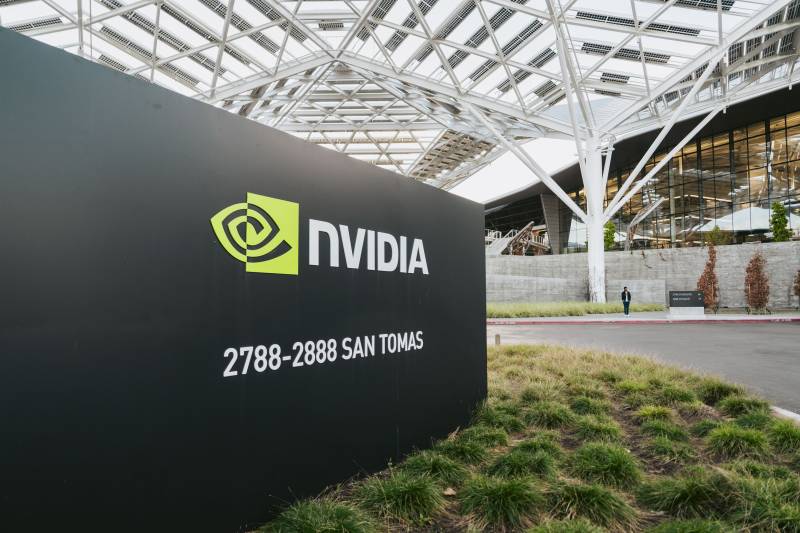
On Friday, Nvidia achieved a remarkable milestone, reaching a stock market valuation of $2 trillion, fueled by the ongoing artificial intelligence (AI) boom. This ascent solidifies its position as the third-largest company in the US, surpassing Amazon and Alphabet. The surge was propelled by an exceptional earnings report, revealing a staggering 265% increase in sales, exceeding Wall Street expectations. In less than nine months, Nvidia doubled its market valuation from $1 trillion, reflecting the tech giant's rapid growth.
Originally known for selling graphics cards to dedicated PC gamers, Nvidia has transformed into one of the world's most valuable companies, primarily due to its dominance in the AI sector. The company's success hinges on the widespread use of its chips for training and running large language models essential for generative AI.
Nvidia's recent earnings report showcased a quadruple streak of outstanding performances, establishing it as the leader in the infrastructure pivotal for the impending AI era. The sales to data center customers, driven by the use of Nvidia's chips, surged fivefold, and after-tax profits skyrocketed from $1.4 billion to over $12 billion, surpassing even the most optimistic forecasts. These results propelled Nvidia to a momentary $2 trillion valuation, making it the third most valuable tech company, trailing only Apple and Microsoft.
Despite Nvidia's remarkable achievements, the chip industry is prone to cyclical swings, exposing companies to potential setbacks. The influx of new investors has heightened vulnerability to perceived setbacks. Questions arise about Nvidia's ability to consistently surpass earnings expectations and whether the AI chip boom will sustain its projected trajectory.
Industry leaders predict a significant and lasting AI chip boom. Lisa Su, CEO of AMD, a key competitor, estimates the AI chip market to reach $400 billion annually by 2027. Nvidia's CEO, Jensen Huang, envisions a massive overhaul of data center equipment, with a predicted total value of $2 trillion in the next four to five years. These forecasts contribute to Wall Street's confidence in the ongoing strength of AI demand.
While Nvidia currently dominates the AI chip market, challenges loom on two fronts. Firstly, the durability of the AI infrastructure depends on businesses realizing value from AI technology. Many companies are still in the early stages of testing generative AI, with concerns about its reliability. Secondly, competition is emerging, especially from major cloud companies like Microsoft, Amazon, and Google, who are transitioning from Nvidia customers to competitors by designing their own chips. AMD has also released chips outperforming Nvidia's, signaling a desire for a more competitive landscape.
In the midst of the AI boom, Nvidia stands resilient. Despite potential threats from competitors and market fluctuations, the company's current position appears robust. The demand for its chips exceeds supply, and its comprehensive set of technologies creates inertia, making it challenging for customers to switch to alternatives.
For 2024, Nvidia appears poised to maintain its leadership position. However, given the immense potential of the AI market and the ambitions of tech giants, Nvidia faces the ongoing challenge of sustaining its position amid evolving competition and market dynamics. Its role in powering the AI revolution is pivotal, and the company's plans to release the B100 chip later this year contribute to positive expectations.
Nvidia's meteoric rise to a $2 trillion valuation signifies its central role in the AI gold rush. The AI boom, reflected in its soaring stock prices and exceptional earnings, has positioned Nvidia as a bellwether for overall interest in AI. While challenges and competition loom, the company's current dominance and strategic plans suggest it will remain a key player in shaping the future of AI technology.

